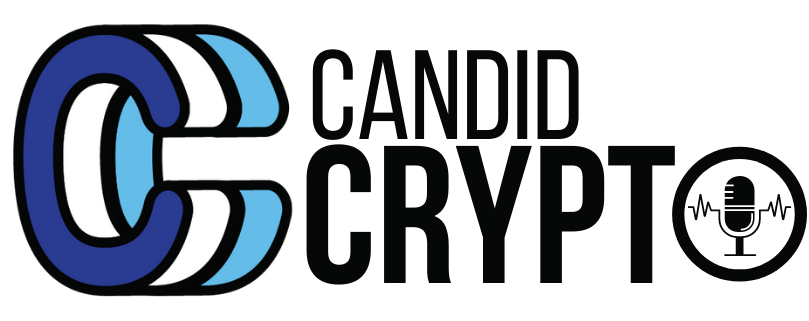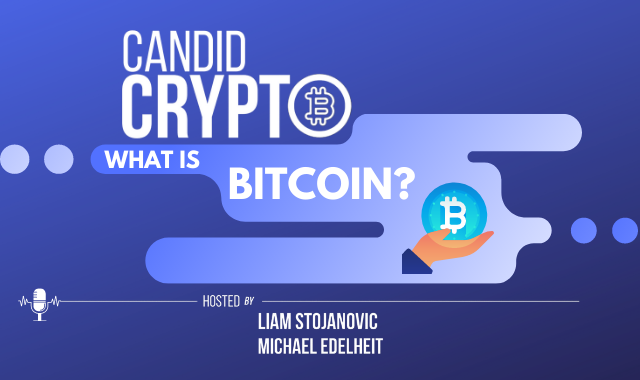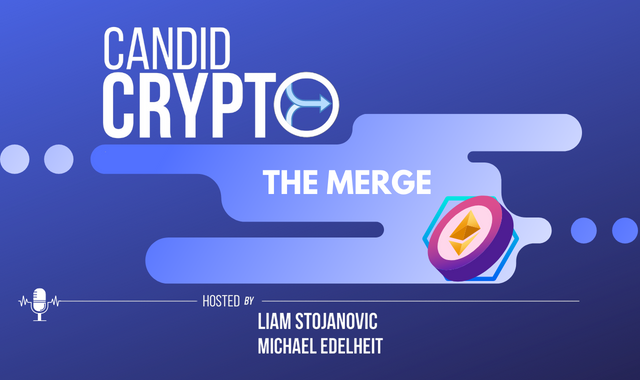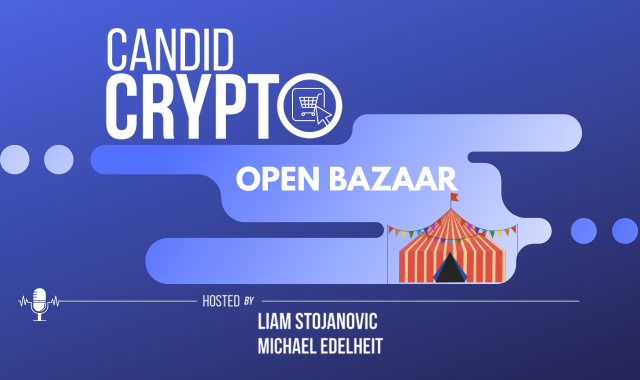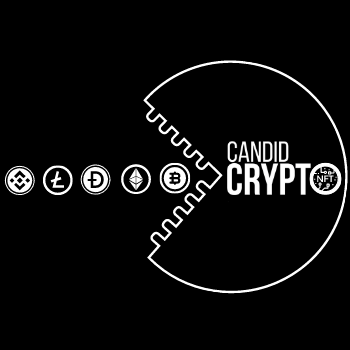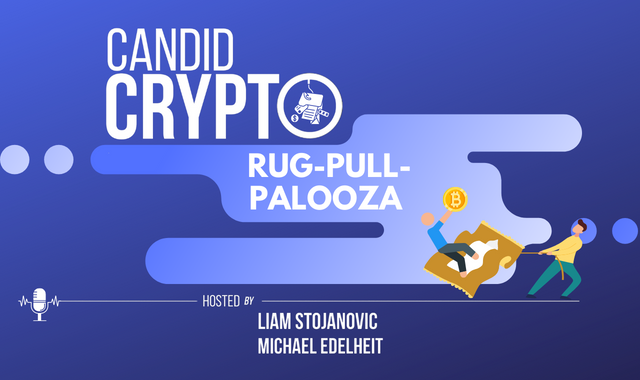002: What is Bitcoin?
Who made it, how does it work, and what is a blockchain?
Please leave a comment and let us know what you think about this episode. You can find Candid Crypto on all your favorite podcast platforms, so please like and subscribe to stay up to date on everything crypto!
Episode Transcription – What is Bitcoin
Liam 00:00
Thank you very much for tuning in ladies and gentlemen. Welcome to another episode of Candid Crypto.
Episode 2. What is Bitcoin?
I’m sure you’ve heard about Bitcoin from friends, family, that obnoxious person at the party who couldn’t stop talking about cryptocurrency whatever your source was, you’ve certainly heard the name it’s become a household name at this point and you really can’t uncouple cryptocurrency from Bitcoin, so yeah, what the hell is Bitcoin?
Michael 00:37
What is Bitcoin? And Liam before we really get into it I’ve literally had this conversation at a bar with a few of my friends that have they know nothing about cryptocurrency and Bitcoin and it’s just fun. I’m glad we’re doing this episode,
Liam 00:53
Dude, totally.
Michael 00:54
Especially for number 2.
Liam 00:55
Totally, totally. Okay, Michael, if you don’t mind, I’m going to kick things off here. So-
Michael 01:01
Let’s get it.
Liam 01:02
Let’s do it. Bitcoin really to me? Well, okay– Bitcoin stemmed, in part from the 2008 financial crisis. And while those events didn’t necessarily correlate with each other, Bitcoin emerged as a technology in August of 2008.
The Bitcoin white paper, which outlines how Bitcoin was going to function was released on August 18, 2008, which was about half a year prior to Bitcoin going live. So the way Bitcoin was kicked off, so to say, was a block was released, known as the “Genesis Block”. And the Genesis Block is what began the Bitcoin Blockchain. This Genesis Block contained a small amount of information to prove that it had been launched on the day it claims to be launched on January 3, 2009, Satoshi Nakamoto, the creator of Bitcoin, put in a small message of text inside of that block. And that message read the times 03 January 2009. Chancellor on the brink [phonetic 02:27] of the second bailout for banks.
Liam 02:31
Michael, who exactly made Bitcoin? Was it a person? Was it a group of people? How does this come to fruition?
Michael 02:41
Yeah, for what everyone knows about the story of Bitcoin, you know, Bitcoin was created by a programmer, and also maybe more like a group of programmers disguised under a pseudonym, of Satoshi Nakamoto. And they slash he was the one that created Bitcoin. And honestly, I frickin love that name. I think it’s the coolest name ever.
Liam 03:09
Totally.
Michael 03:10
Good to go down in the history books.
Liam 03:12
So Michael to you; What problem did Bitcoin solve? Like, why should anyone have cared about Bitcoin back in 2009?
Michael 03:23
Yeah, so Satoshi Nakamoto, came up with the concept, a very simple concept in my mind, of why do we need a bank or third party for two people to pay each other?
Liam 03:39
Right.
Michael 03:39
You know, they asked that question. And then they solved it with Bitcoin.
Liam 03:44
Right. And it’s to me, what really blew my mind about Bitcoin when I was first reading about it in 2011, was;
“The notion that a file on your computer could represent wealth”.
That was mind blowing, truly, because in the past, you always had to rely on Chase, or PayPal, or US bank, or whoever your institution was to tell you, you had those funds available in your account. Now, for the first time ever, those funds were on your computer enclosed in a file that only you could access or transfer.
Michael 04:24
And most importantly, it was designed to allow people to swap digital money instantly, without needing to rely on a third party or bank.
Liam 04:33
Yep. So I mean, when Bitcoin was first kicked off, there were no clear use cases for it yet. It wasn’t worth much. It was a novel technology. No one knew if it was going to be working in 5 or so years. Bitcoin relied on the network effect, aka people using it in order for it to be valuable. So really, its first use case was digital Cash Bitcoin would allow a person to transfer their wealth to another person without any oversights, without any institution, or regulatory body telling them they could or could not do that.
Michael 05:17
And I think it’s important for listeners to know that although it’s digital cash at this point, Bitcoin, I feel like is a lot more than just that single use case.
Liam 05:30
Yeah, totally. So, the underlying technology of Bitcoin is known as Blockchain. And if you’ve heard of Bitcoin, you might have heard of Blockchain. Blockchain is really the workhorse and the system that powers Bitcoin. It’s what allows Bitcoin to function. And in essence, a Blockchain is a system in which a record of transactions made in Bitcoin or any other cryptocurrency are maintained across several computers that are linked in a peer-to-peer network. When we think about the practical sort of manifestation of that. What that really means is that you have computers all over the world running the same program, and they all talk to each other.
Michael 06:20
Yeah. And it produces blocks of information, not money, as you know, we would maybe think, in traditional senses, but it produces blocks of information that are all linked together in a synchronous chain, which is also a fundamental behind Bitcoin and Blockchain technology. It’s synchronous, and everybody can see what’s going on in the Blockchain.
Liam 06:47
Yeah, totally. Um, the reason why it’s called a Block, is because transactions are lumped together in Blocks. And in essence, within the case of Bitcoin, every 10 or so minutes, a Block is created. And once that Block is published on the Blockchain, it is immutable. Those transactions can never be reversed.
Michael 07:10
Yeah. And, you know, it kind of brings it to the point that Bitcoin and Blockchain technology is really the first time we can create digital trust between people. You know, before, we never really knew what was going on in the backend. And if I sent you money, through Chase, or whoever, you never really know how that is processed, and you never know, did you actually receive the $10? Or did $100 get drawn from my bank account? Now through this database, this ledger, and Blockchain technology, Bitcoin changes everything. it’s immutable, and everybody knows what’s going on. So Liam! I mean, the important thing about Bitcoin is that you don’t need a third party or bank to send and receive Bitcoin. So how would I send Bitcoin to you?
Liam 08:06
Yeah, great question. There are a multitude of services that allow you to create a “Bitcoin Wallet”. A Wallet is a term that refers to a grouping of “addresses”. Addresses are what you use to specify recipients when you send cryptocurrency. So if you go to say, @bitcoin.org, you can download the full Bitcoin software that will allow you to receive Bitcoins, more practically, what you’re likely going to do is get a mobile wallet or a lightweight client on your computer, which, for all intents and purposes, that really means you’re not doing all the heavy computation required to participate in the network, you’re just acting as a lightweight peer. And in essence, it’s pretty simple. You download and install your Bitcoin client of choice. I personally prefer Electrum, which is available for desktop and essence, you download Electrum it’ll generate a new Wallet for you, that is unique only to you. It’s a wallet that has never, ever been used by anyone else. And then you take those addresses that were generated from the wallet, you give that to the party who wishes to pay you, and then they broadcast the transaction, which really means they just hit the send button on their Wallet. And once they hit that send button, you will see the transaction appear almost instantly on your end. And that’s really all there is to it. It’s pretty simple. Copy and paste an address, give it to the person you want to send you money, and then Ka Boom!!
Michael 09:00
And you don’t have to wait for that pending. I hate pending [crosstalk]
Liam 10:04
You know, like, when you think of a bank transfer, okay with Zelle, you can send money instantly. But there’s a limit to that, with an ACH transfer or an Automated Clearing House transfer, you’re typically waiting two to three business days for that to fully clear. Bitcoin… Well, you’ll see the transaction appear instantly and within an hour, it’ll be fully confirmed and in your wallets.
Michael 10:30
Amazing.
Liam 10:31
Absolutely incredible. I love it.
Michael 10:33
So Liam, we talked about Bitcoin uses Blockchain technology to transfer money. But we also talked about that it’s so much more at this point. So what are the other uses of Blockchain technology?
Liam 10:49
First and foremost, I think that voting is the best use case for Blockchain technology besides digital cash, you could very feasibly create a system where voters could vote and send their votes through a Blockchain system. And that would allow traceability and auditability in the entire voting system, while still maintaining an aspect of pseudo anonymity. It’s pretty fascinating stuff. And there have certainly been governments that have been toying with that idea. Although as far as my knowledge goes, no one has implemented that on a wide scale. But I’d like to fact check that, that might be an interesting topic for future discussion.
Michael 11:33
Yeah, that would be really interesting. I mean, I agree that besides money, that is probably the most effective and most revolutionary way to actually use Blockchain technology is for voting. But, you know, besides Bitcoin, and when it comes to cryptocurrency, as a whole, unless you’re very, very new. Bitcoin might be the only cryptocurrency that you have, or have even been exposed to or even heard of. But most people have probably heard of a few other alternative coins and cryptocurrencies that started from Blockchain technology and started after Bitcoin. Some of them might be Ethereum, Litecoin, Bitcoin Cash, these all were created after Bitcoin because-
Liam 12:28
Yes, and the scope of the episode isn’t to discuss all the alternative coins that exist. However, it’s important to note that Bitcoin came first. And the technologies that have emerged after it, have used Blockchain in creative ways that solve problems besides digital cash transfers. And people have tweaked things to make transactions faster or to allow you to store different information on the Blockchain. But at the end of the day, Bitcoin was the first true Blockchain application that existed, which is very miraculous. The Blockchain itself is an intricate piece of technology that relies on a few different moving parts. At the end of the day, it is a mix of cryptography and computer science that really makes the magic happen.
Michael 13:24
Yeah, and you know, once you hear cryptography and computer science that might kind of send people away. But I really like comparing Blockchain technology to and using the internet, essentially, the Internet was created. And after, you know, during the.com era, all these people started seeing the potential the internet and they were able to create these new web applications, to solve everyday problems that people are plagued with. Essentially, Blockchain is this new technology that we’re all getting exposed to, and we’re all seeing the potential to use. It’s allowing programmers and other people to build different alternative coins and cryptocurrencies that have different use cases that solve everyday problems like voting or transferring money.
Liam 14:21
The Internet gave way to people being able to create websites and services and web applications on top of that base layer of the internet. Blockchain exists as a layer on top of the internet. And in essence, Blockchain technologies allow you to come to consensus using the internet in a very elegant way, and that consensus mechanism has so many use cases, it has so many undiscovered, but potentially killer use cases in the cryptocurrency scene.
Michael 14:57
We keep on talking about Bitcoin and block Blockchain technology, but I think it’s really because it is really important to understand the basics behind this technology, because it’s only going to become more prevalent throughout the world. And it has so much potential to solve so many different problems. So, if you’re new, really try to connect to the fundamentals and the basic understanding of Blockchain technology. And you know, your world’s just going to open from there.
Liam 15:31
So then the final question is why, you know, why use Bitcoin? Why participate in it? So many it might come across as a speculative investment or even worse, something that Elon Musk incessantly tweets about? Why should someone participate in the cryptocurrency ecosystem? What’s the incentive there?
Michael 15:58
Well, I think the incentive is we don’t have to rely on these institutions, banks, and third party people. Also, we’ve talked about its instant. And we’ve talked about it is probably one of the most secure technology because you can see everything that’s going on. And I feel like that is completely unique than anything else. And up until 2008, and 2009 when this technology was first thrown into the world, we didn’t understand how to do this. What do you think? Why should people use cryptocurrencies? And why should people use Bitcoin?
Liam 16:42
I think it’s empowering. You know, there are many people in the world who have access to the Internet and computers, but may not have access to modern banking, the amenities that provide, and may not be able to participate in the economy. Like they should be able to, because of arbitrary restrictions enforced by their government or any other reason. In essence, to me, the battle cry for Bitcoin, is really that anyone can download and install the Bitcoin client and begin sending and receiving Bitcoin, just like that. And no one can tell you no. They’re your coins. They’re your funds, and no one can take them from you. That’s pretty magical to me, and I think there’s a tremendous opportunity for more people across the globe to be empowered and gain financial freedom through cryptocurrency.
Michael 17:51
Yeah. And everyone should understand that it has its ups and downs, and it will continue to have its ups and downs. As governments start using it more, and as it starts being regulated more and, you know, as the world actually starts using this as our global currency.
Liam 18:13
Totally. Absolutely. And then my last question for you Michael; Do you think that the price of Bitcoin will continue to increase tremendously as it has in the past? Do you think that we’re going to hit a $100,000 Bitcoin by the end of this year? And to paint a little bit of perspective, when I was first introduced to Bitcoin bitcoins set at about $23 A coin, and no one ever could have fathoms that the cryptocurrency you would buy and sell on Magic, the Gathering Online [phonetic 18:57] exchange would turn into the behemoth, the monolith of value that it has today.
Michael 19:08
It is truly amazing. And for anybody that hasn’t read this article, heard this story, definitely look up the 10,000 Bitcoin for a pizza.
Liam 19:19
Yep, the 10,000 Bitcoin pizza is my favorite because this is a pretty big recurring theme in the cryptocurrency community and I wish it wasn’t but it’s. The recurring theme that I see a lot and then a lot of people like to talk about on Reddit or Telegram or Discord is ‘Oh, the 10,000 Bitcoin pizza guy, what a sucker’, he spent 10,000 Bitcoin for a pizza. Nowadays that’s worth 5 million-plus dollars (correction, it is more like 500 million). I for one, don’t like to look at that. I don’t like to look at it that way because shoulda coulda woulda, no one really could have anticipated how much this would be worth. It could have faded into obscurity and died. But it didn’t, it persevered. And as much as I thought to myself that I was a Bitcoin believer when I first discovered it, I didn’t really stack and accumulate coins until much later in my life, partially due to maturity, partially due to my own conviction about the technology, I didn’t know if it would work long term because no one did.
The fact that there were some people who held on to their coins through thick and thin is really impressive to me. And going through the bull and bear cycles in regards to Bitcoin and still holding on. That’s impressive.
Michael 20:35
That’s really impressive.
Liam 20:37
And that’s where the meme of HODL comes in. For those unaware, H-O-D-L, or HODL refers to purchasing and holding on to cryptocurrency, which might sound a little counterintuitive, right? If you want a cryptocurrency to gain mainstream adoption, shouldn’t there be traction? And you know, economic transact? Should there be transactions occurring in the ecosystem? That’s a question that is hard to answer honestly. Because yes, people hoarding Bitcoin will drive the price of Bitcoin up, however, will that sentiment make it 30 years in the future? Are people 30 years from now going to say, ‘Oh, just keep holding on to Bitcoin because it’ll be worth even more’. Is that how this is going to progress? We really don’t know.
Michael 21:30
No one knows. And, as you said, I mean, it was very new 10 years ago, but we’ve approached that point where it stayed around, and it has proven itself. So that’s why it’s really interesting over this past bull cycle, with the price of Bitcoin and almost all the other cryptocurrencies, you know, it’s established enough that now institutions are putting their money in it. And when you asked me, “Is it going to be $100,000 at the end of 2021?” I don’t know that I’m not even going to attempt to speculate. But in our lifetime, in the next 10 years, I am fairly confident that it will be $100,000 one day, potentially even more 200, 300. I mean, I really think it’s pretty limitless. We didn’t really touch on this a whole lot during the episode, but just the circulating supply of Bitcoin, there’s a finite number of Bitcoin that will ever be created. And that will ever be mined. And I think that definitely helps the price of Bitcoin and makes it more valuable. You see, over the past year, almost on a global scale, every government and country is printing just as much money as they want. You know, that’s cool. But you can’t do that with Bitcoin. So I really do think that also helps maintain that value in the long term.
Liam 23:07
Certainly, and this is kind of a weird thing to think about. But as Bitcoin gains more mainstream adoption, and as you’re able to purchase more goods and services with Bitcoin or cryptocurrency the value of Fiat continues to decrease relative to crypto. As crypto becomes more and more the preferred bartering token, so to say, in transactions on a day to day basis, the comparison of Bitcoin to Fiat might be something we laugh about in 10 or 20 years, because you won’t use fiat money for most things.
Michael 23:47
Yeah, that’ll be really interesting episode to do in the future.
Liam 23:52
Yeah. I would like to do that. So, at the end of the day, Michael, and I find the topic of Bitcoin and of cryptocurrency absolutely fascinating. And, you know, we have a lot of fun teaching anyone that cares to learn about it with us.
Michael 24:14
Yeah. And who knows, in the end, we all might be able to make a lot of money off of it.
Liam 24:20
Very true. That’s the icing on the cake. But really, I feel passionate about the technology, and if there is money to be made, and that’s an added bonus, but really, the technology to me is something that I read about obsessively that I love to understand further and I love to communicate to people. It really is crazy that we have digital money, true digital money, it’s awesome.
Michael 24:46
It’s so hard to even fathom that we would be in our 20s and actually have this technology accessible. So I’m really excited to see where it goes.
Liam 25:00
Yeah, and if you continue to accumulate Bitcoin as an individual, one day you might be on a gift shop in Mars and you going to definitely pat yourself on the back for having Bitcoin available to purchase a Martian t-shirt. Thanks again for tuning into another episode of Candid Crypto.
Michael and I are working on getting on Spotify, Apple Podcasts, and Google podcasts right now. You can find us on Google podcasts and give us a follow. But if you want to stay up to date on the news around Candid Crypto, you can head to our website @CandidCryptoPodcast.com. You can find our socials there and you can find all the episode material. We’re getting these episodes out on a weekly basis. So tune in again next week.
